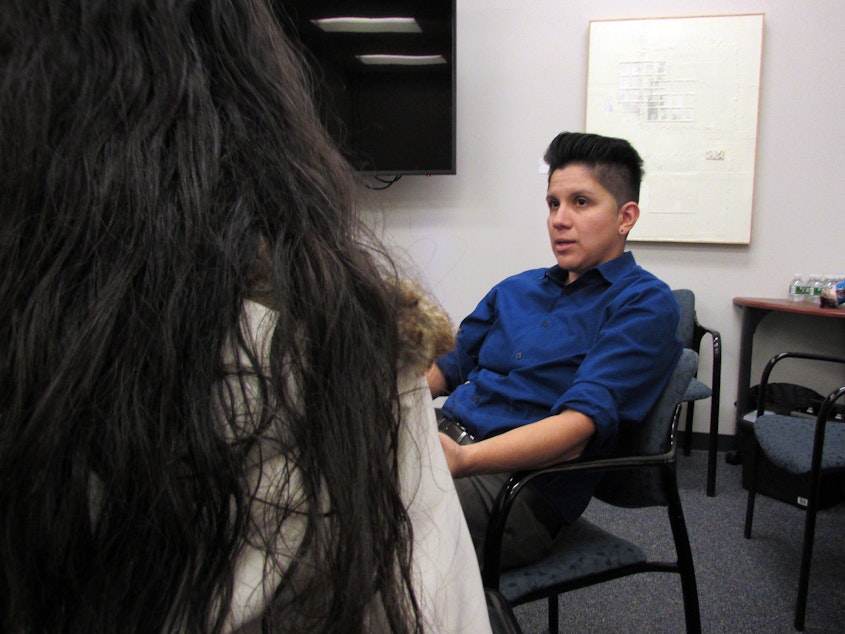Why King County no longer prosecutes kids who beat their parents

Vicky used to hide the knives in her home, but not because of the ex-husband who she says was abusive.
She was being beaten by her 13-year-old son.
“He would kick me, punch me, abuse me. Call me the worst words,” she said, as social worker Claudia Pineda interpreted.
Her son wasn’t going to school and sometimes wasn’t coming home at night. He was hitting his two younger siblings.
“It was really stressful because I wouldn't sleep at night,” Vicky said. “I would be calling the cops, calling my family members. I had no idea where he was.”
Sponsored
Vicky said she feared he would go to jail.
We’re not using her real first name because she fears her ex-husband.
Family violence is complex and paralyzing. More than half the time for young abusers it’s also a learned behavior.
“It's most often dads toward the moms,” said Lily Anderson, a social worker with King County and an expert in domestic violence. “And then when the children become adolescents they start acting like their dad toward their moms. That’s a very common scenario.”
Over the past two years more than 700 young people in King County have been arrested for committing violence against a family member.
Sponsored
In the past that meant a trip to detention and a possible criminal record.
But the county says that approach wasn’t helping. So about a year and a half ago they stopped prosecuting and started offering something different: an intervention.
Instead of to a jail cell, youths are taken to an unlocked converted space in the detention center. There they get a room, a bed and a meal.
Family members stay separated for a few days while social workers like Pineda listen to their stories. They develop a safety plan. Pineda said often it’s the first time parents or guardians feel supported instead of blamed.
“They often are [blamed] when they do reach out for help,” Pineda said.
Sponsored
For Vicky it was a relief. Pineda shared her ethnicity, spoke her language and listened without judgment.
“I adore my children,” Vicky said. “They’re my motivation to go on, and I would do anything for them. Even the impossible.”
So last March Vicky and her son entered into an agreement with King County Juvenile Court to participate in one of the programs the country is using. It’s a 20-week program called Step Up that focuses on building relationships and accountably. Anderson co-wrote the curriculum.
“We directly address the violence and the kids know: I'm here to stop being violent and that's what we're all doing,” Anderson said.
Sponsored
Paul Daniels, a program services manager for the Juvenile Court, said going to court in these cases can tear families apart. This intervention approach makes services available when they’re needed. It’s also voluntary.
“My biggest fear is that they wouldn't stay,” he said. “They'd come here and since there were no locks on the doors and no requirement to actually stay, I thought kids would get up and walk out the door. And I couldn't have been more wrong."
Daniels said several hundred kids have come through the intervention program at the detention center, but only one has walked away.
And only 8 percent have re-offended.
The model also has shown to serve more families of color than the county’s other diversion programs.
Sponsored
Vicky said that even though her son signed on to the program, at first he would get abusive and refuse to go.
But Pineda, the social worker, developed a strong relationship with the boy and things began to turn around.
“There’s a notable difference,” Pineda said. “He's a different kid. He comes and smiles and laughs. He hugged me last week when he saw me.”
Vicky sees the difference too. She said her son is happier and he goes to school. She also has a plan if he gets stressed out or angry.
Things aren’t perfect.Vicky said she reminded him and called and texted him about our interview. But he didn’t show up.
But he’s is not in jail, she said. Her younger children are safe. And she doesn’t feel like she has to hide the knives anymore.
The Step Up program can be reached at 206.296.7841 for questions or more information.

